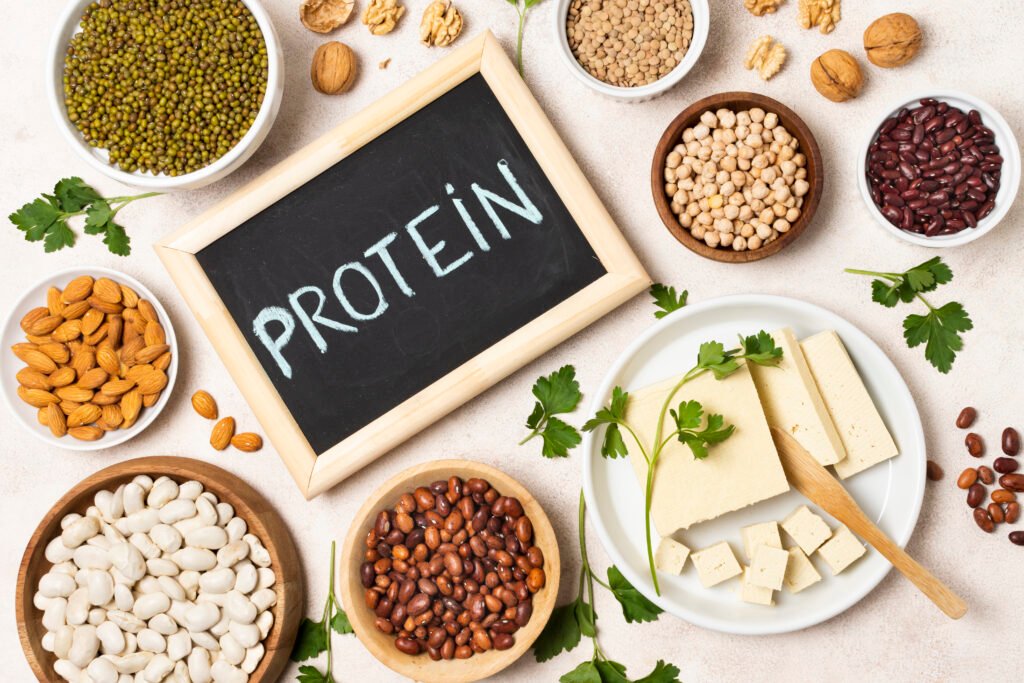Protein is often referred to as the body’s building block—and for good reason. It’s involved in nearly every biological process, from muscle repair to immune function, hormone production to energy regulation. Despite its importance, many people still overlook protein when planning their daily meals, focusing more on calories or carbs. But whether you’re a growing child, a busy adult, an athlete, or simply someone aiming for better health, protein is crucial for maintaining physical strength, mental clarity, and metabolic balance.

1. Understanding Protein: The Body’s Building Block
Protein is one of the most vital macronutrients required for the proper functioning of the human body. It plays a central role in building and repairing tissues, including muscles, skin, and internal organs. Every cell in the body contains protein, making it essential not just for bodybuilders or athletes, but for everyone, regardless of age or lifestyle. Proteins are made up of amino acids—some of which our bodies can produce, while others, known as essential amino acids, must be obtained from food. This makes it critical to include a balanced intake of protein in our daily diet.
Biologically, proteins serve more than just structural roles. They are involved in the production of enzymes, hormones, and other important body chemicals. From supporting immune responses to carrying oxygen in the blood via hemoglobin, the functions of protein span across nearly every physiological process. Without adequate protein, the body cannot maintain homeostasis, leading to muscle wasting, fatigue, and impaired recovery. Recognizing protein as a cornerstone of cellular health underlines its irreplaceable role in our daily nutritional requirements.
2. Protein’s Role in Muscle Growth and Metabolism
Protein’s most celebrated function—particularly in fitness communities—is its contribution to muscle growth and repair. When we exercise, especially during resistance or weight training, small tears occur in muscle fibers. Protein helps repair and rebuild these tissues, leading to stronger and larger muscles over time. This process is known as muscle protein synthesis. For individuals looking to build lean muscle, lose fat, or maintain strength with age, adequate protein intake is crucial.
Moreover, protein influences metabolism more than fats or carbohydrates. It has a high thermic effect, meaning the body uses more energy to digest protein than other nutrients. This can assist in weight management by promoting satiety and reducing overall calorie intake. Including protein-rich foods in meals and snacks can curb overeating and help stabilize blood sugar levels, reducing cravings and mood swings. In this sense, protein supports not only physical strength but also long-term weight control and metabolic health.
3. Protein Needs Across Life Stages
Protein is not a one-size-fits-all nutrient. The amount required varies depending on age, activity level, and physiological conditions such as pregnancy or illness. Children need protein for growth and development, while older adults require it to maintain muscle mass and prevent age-related sarcopenia. Athletes and highly active individuals also have higher protein demands to support muscle recovery and energy needs.
Pregnant and breastfeeding women need extra protein to support fetal development and milk production. Even during recovery from injury or surgery, the body calls for more protein to rebuild damaged tissues. Despite these varying needs, many people still fall short of meeting optimal protein intake, particularly those following restrictive diets or lacking awareness about protein-rich food sources. Understanding one’s specific protein needs and incorporating a mix of plant-based and animal sources can ensure balanced and complete nutrition throughout life.
4. Choosing the Right Protein Sources for Long-Term Health
Not all proteins are created equal. While animal-based sources such as meat, eggs, dairy, and fish offer complete proteins (containing all essential amino acids), plant-based options like legumes, nuts, seeds, and grains can also provide high-quality protein when consumed in variety. The key lies in balance and diversity. A well-rounded diet that includes both animal and plant proteins can meet nutritional needs while also supporting ethical, environmental, or dietary preferences.
It’s also important to focus on the quality of protein consumed. Lean meats, low-fat dairy, and minimally processed legumes or tofu are healthier choices compared to heavily processed meats or protein bars loaded with additives. By making informed choices and understanding the different roles protein plays—from muscle repair to immune function—individuals can harness its benefits to support long-term health, vitality, and well-being.
Conclusion:
Protein is far more than just a nutrient for gym-goers—it’s an essential part of life. From childhood growth to aging gracefully, from metabolic health to disease recovery, protein supports the body at every stage. Recognizing its importance and making intentional dietary choices can have lasting effects on physical strength, energy, and overall wellness.
click here to know about how to include protein in your diet
